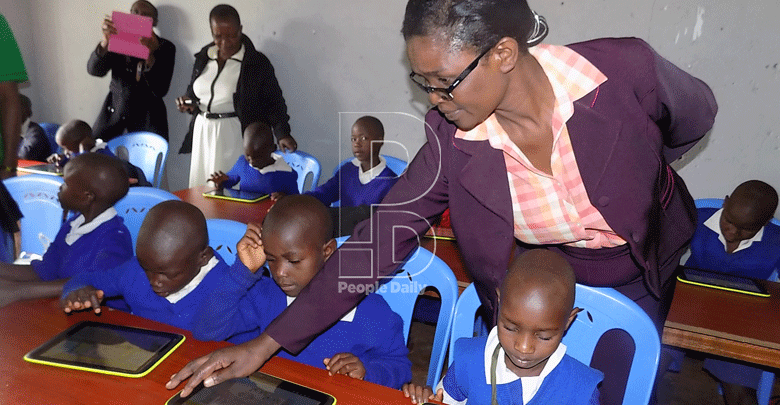1,000 schools to pilot new Internet connection plan

More than 1,000 schools have been identified to benefit from phase one of the Schoolnet connectivity project, the ministries of Education and ICT have announced.
ICT Cabinet Secretary Joe Mucheru yesterday said one school from each ward will benefit from the project which will leverage on the existing National Optic Fibre Backbone Infrastructure.
He said the project involves introduction of advanced digital devices that have SIM card slots or capability to enable broadband connectivity that support 3G and 4G networks.
“Some of the benefits can be accrued through delivery of digital content, leading to improved educational outcomes like basic skills in reading, writing, numeracy and exam performance.
This would radically change the traditional examinations with digitally delivered exams, ease of data collection for schools and education sector based on attendance,” Mucheru said during a virtual Senate Education Committee meeting on status of e-education in the country.
Also present were Education Principal Secretary Julius Jwan and Chief Administrative Secretary Sarah Ruto.
Interactive content
Ruto said the ICT ministry undertakes procurement and distribution of the digital devices for deployment to schools and developing prototypes of suitable devices, while the Education ministry identifies the schools, ensures their readiness, orientates the teachers and supervises the distribution of devices to schools.
On the status of implementation of the Digital Learning Programme (DLP), Mucheru said Phase I, under the Financial Years 2016-2020, provided digital devices with preinstalled digital interactive content for Grades One to Three.
“This phase emphasized the need for learners “learning to use” the technology.
The objective of the phase was to expose learners to friendly technology to encourage early adoption,” said Mucheru.
He said Phase II, which runs from 2019-2023, aims at exposing learners to technological tools for learning to enhance creativity and innovation.
The phase targets provision of advanced learner digital devices for Grades Four to Six in line with the Competency Based Curriculum (CBC) rollout in middle school.
“This phase emphasizes the need for learners “using to learn” the technology.
The phase targets Grade 4-6 with advanced learners digital devices as per the school enrolment and three advanced digital devices for a teacher, five digital output devices and one wireless access point per school,” explained Mucheru.
Smart classrooms
But as the DLP project is being implemented, the CS said teachers capacity has been inadequate.
“Teachers have indicated that they do not have adequate ICT skills to integrate the DLP solution in teaching and learning.
There has also been inadequate policy framework to guide delivery of education through ICT and digital content on CBC,” said Mucheru.
He said inadequate funding had also come in the way of Phase II. He explained that contracts signed with Jomo Kenyatta University of Agriculture and Technology (JKUAT) and Moi University will cost Sh62 billion.
Under the 2020/21 financial year, however, the programme received Sh670 million, which has further been revised downwards to Sh506.5 million, he said.
Ruto told the committee that the Ministry intended to establish computer laboratories (smart classrooms) under DLP in all public primary schools.
The implementation of the project is spread out in three financial years (2019/20, 2020/21 and 2021/22) covering designing, specifications and implementation, targeting Grades 4-6.
“This will be achieved through enhanced devices with keyboard and appropriate software tools to enable creativity and innovation.
A ‘shared Smart Class’ with required infrastructure and tools will be provided to the schools,” said Ruto.
She said the smart classrooms will be critical in supporting the implementation of CBC in primary education.
“The Ministry identified 8,000 public primary schools in the counties to benefit from the financial support in the current financial year 2020/21.
The number of schools identified per county was based on pro-rata basis where the county with large numbers of schools will have more slots in the list of schools to benefit,” the CAS said.
Ruto said all public primary schools will benefit from the funding spread over three years.
“Year 1 (2019/2020), 8,000 were provided, Year two (2020/2021), additional 8,000 will benefit and during the third year (2021/2022) the remaining public primary schools will receive the funding,” she explained.
She said the funds would be used in improving ICT infrastructure for schools which includes refurbishment of existing Grade 4 classrooms by improving on security (burglar proof on windows and doors), electrical wiring, construction of a storage and charging cabinet and fixing of a white board in the classroom.












